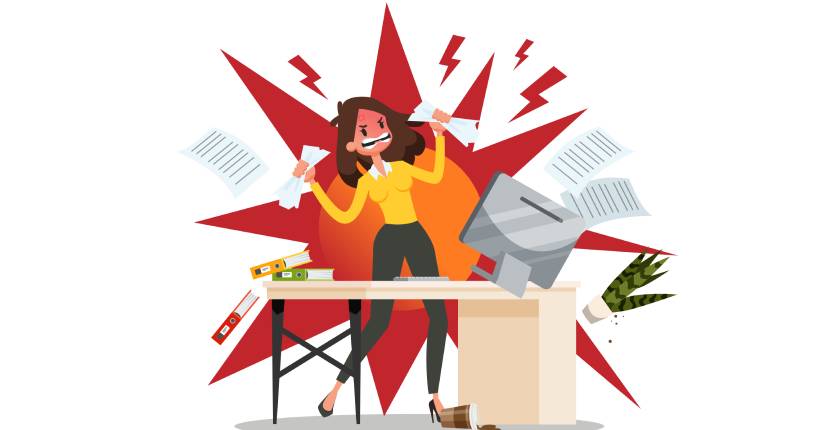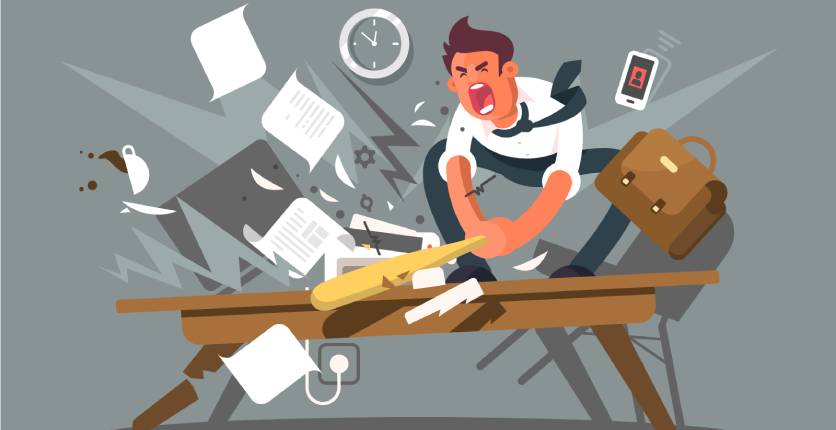Stressed with the continuing WFH status quo or back-to-office transition? Irritated with the increasing volume of traffic on the road or crowds on public transport? Or, just frustrated with some major people – including your boss or loved ones – in your life because of some recurring minor issues? Whatever the reason or situation, we sometimes find ourselves letting anger ruin our day, by having it bring out the nasty in us.
Anger is a normal, healthy emotion, but sometimes, it can be expressed too often, too intensely, and in less than pleasant ways, resulting in unintended insults, harmful emotional outbursts, or even physical altercations. If you find yourself getting too heated too frequently, try employing some simple anger management strategies so as to keep calm and not too carried away.

Take A Timeout
When the going gets tough, the tough takes a break. Yes, even the hardiest among us can feel moments of frustration, irritation or stress, that can easily tip us over into anger. So, when you start having such emotions fueling up, give yourself some time by physically stepping away from the people who are causing you distress or by removing yourself from the situation. Get to a place where you can be alone or be with a confidante (read why in “Talk To A Close Bud Or Your Other Half” listed later below), just to process your thoughts and emotions, and essentially, chill out. It could even be part of your regular daily routine, just to get yourself “re-centred” to face the rest of the day.
Do A Countdown
Yes, literally, be it in your head (if you are unable to be alone on a timeout) or aloud (if you are in a quiet space by yourself). Start from 10, 100 or even your favourite number (at least in double digits, otherwise it kind of defeats the purpose), as long as the duration of the countdown is long enough to slow your escalated heart rate and let your anger subside. Plus, you will be surprised how the act of having your mind do such basic math can actually distract you from being furious.

Shut Up & Think Before You Speak
Sometimes, we do let our mouths run away in the heat of the moment, resulting in hurt and regret, for both the other party and ourselves. Take a moment or two to keep quiet and don’t let the words fly, think about what you want to say before saying them, and let the other party collect their thoughts, too.
Take A Breather
Again, literally, slow your breathing down. When we get into an agitated state, our heartbeat ramps up and our breathing gets shallower; take deeper breaths using your diaphragm by inhaling deeply through your nose and then exhaling through your mouth, so as to help let yourself return to your usual – and preferably calmer – state of body and mind.

Use Your Imagination To Escape
If you can’t get away or far enough from the source of your exasperation physically, then put some distance between the upsetting situation or person and you by harnessing the power of your mind to lessen your displeasure. Close your eyes and visualise a pleasing scene – picture yourself in an open-air bath in nature, think about how the water feels and looks, of how beautiful the surrounding forest is and of the types of cheery yet comforting sounds you expect to hear in such a blissful oasis. It is a relaxation technique that could help you plan for your next escape for when you are able to!
Repeat A Mantra
It’s a simple relaxation technique: Identify a word or phrase that can help you calm down, refocus or reaffirm yourself positively, and repeat it over and over to yourself when the maddening feels come on. It can be anything from a short “Chill” to “It’s going to be okay” to even a lengthier “Sticks and stones may break my bones, but words can never hurt me” – whatever words that work for you.
Picture A Visual Sign
This is like the aforementioned mantra, but visual. Find an image or a set of images – it could be a stop sign or traffic lights – and stick it in your head as a clear and strong visual sign that can be easily recalled as an indication or reminder for you to immediately cease, desist and walk away, before things go south. Bring this image or set of images up in your mind whenever you start boiling over.

Relax Your Body
When you get angry, your muscles can get tensed up. Try some progressive muscle relaxation, where you deliberately (and when you don’t base your actions on being emotionally fired up) tense and slowly relax the various muscle groups in your body, such as by clenching and unclenching your hands or curling and uncurling your toes. Couple these actions with some slow breathing and non-strenuous stretching moves like basic neck rolls and shoulder rolls to make your relaxation more effective. Just don’t do this in the presence of the other party you might be beefing with, in case he or she reads you wrong, as wanting to get confrontational.
Get Physical
No, we do not mean get into an actual fist fight. This can yet be another timeout routine (but only if you have much more time to cool down), where you get to carry out an enjoyable physical activity or indulge in your fave sport ( for example, golfing or swimming). Exercising can help to not only unwind your inner knots and lower the level of your vexation, but also bring about peace of mind, relaxation and some physical health benefits!

…Or Get Creative
If you aren’t the sporty sort and more the arty kind, then channel your wrath to your creative and more productive pursuits. Be it gardening, drawing or writing poetry, these outlets might yield the best returns on your negative, vested feels and end up helping you produce your best work yet!
Walk It Out
Think of this as your timeout, but longer. If you are able to, go stroll around the neighbourhood to look (and get) outside of yourself, at greenery (it’s a calming colour), or the blue sky and white clouds (also, calming colours) to reduce all the “red” you feel within so you can be more at ease and less “inflamed”.

Listen To Some Music
You know the common saying that “music soothes the savage beast”? It might just work – pop in your earbuds or crank up the volume (only in your room or car, please) and let your fave tunes bring you to your happier place. So, shake it off!
Laugh It Off
Here’s another common saying to note: “Laughter is the best medicine”. Have a good mood replace a bad one by either using humour to defuse the situation or lighten the tension if you are caught in the midst of an argument (but avoid belittling sarcasm as it could result in further misunderstanding); or diffuse any residual indignation by engaging in activities to get you (or any other parties) to laugh, such as by watching vids online or playing with your pets or kids. The trick is to use humour and laughter constructively when necessary, and not merely as a means to avoid or escape from a recurrent problem.

Talk To A Close Bud Or Your Other Half
This coping tactic works – only if your BFF or significant other is not the one you are having a dispute with, that is. Chatting with someone who’s in your corner can help cool you down, provide support and give you new perspectives on or even solutions to solving issues pertaining to your antagonisation. Just make sure not to make it purely a venting session or to focus only on negative thoughts and feelings as it could end up aggravating you more instead of helping you resolve your wrath.
Seek Some Help If You Need To
As mentioned, anger is a normal emotion that everyone experiences, now and then. But, if you figure that this emotion seems to affecting you more frequently or more intensely, causing more long-term problems in your personal life and with the people you love, or turning into less-manageable, stronger aggression, you might consider approaching other people outside of your familial and social circle.

These might not qualify as easy tips for you to take, but you can try the National Care Hotline at 1800-202-6868, TOUCHline (Counselling) at 1800 377 2252 or any other general helplines available to the public that you feel comfortable in calling. Or, you can opt to speak to a doctor or physician directly for more professional advice. Remember: Don’t just get angry nor get even; get some help if you can’t help yourself.







